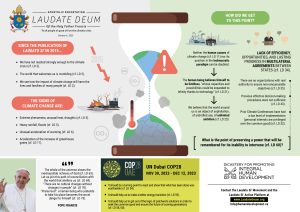Pope Francis released ‘Laudate Deum’, his apostolic exhortation on the climate crisis, on the Feast of Saint Francis of Assisi, October 4. Officially titled, ‘Laudate Deum: To all the People of Good Will on the Climate Crisis’, the exhortation is a sequel to his exhortation, ‘Laudato Si’: On Care for Our Common Home [2015].
Sandra Dillon, Catholic Earthcare Ballarat writes:
Laudate Deum (Praise God) is an update to Pope Francis’ encyclical Laudato Si’ and begins with the message of St Francis of Assisi , “Praise God for all his creatures”.
The Apostolic Exhortation (13 pages only) by Pope Francis was released on October 4, the Feast of St Francis, eight years after Laudato Si and speaks to “all people of good will on the climate crisis”. It begins by directly stating that the global response to the climate crisis since the encyclical Laudato Si was released has not been adequate, that “the world in which we live is collapsing and may be near breaking point……this is a global social issue and one intimately related to the dignity of human life”.
The impact of climate change is increasingly affecting healthcare, work, food, housing, increasing forced migration of people and causing catastrophic extremes of weather – it is “one of the principal challenges facing society and the global community”.
This document includes the conclusions and projections of the overwhelming majority of specialist climate scientists. Pope Francis speaks of the small percentage who deny the effects of the climate crisis despite the evidence. He also speaks of the great economic powers who prioritize “the greatest profit at minimal cost and in the shortest amount of time”, causing environmental effects some of which are now irreversible. These decisions have highlighted our global interconnectedness, that what happens in one part of the world has repercussions on the entire planet.
He speaks of a ‘growing technocratic paradigm” which consists of thinking as if reality, goodness and truth automatically flow from technological and economic power which in turn leads to acceptance of “unlimited growth, which proves so attractive to financiers and experts in technology”.
The natural resources that are required for technology are not unlimited, but the ideology underpinning this obsessive growth is ‘to increase human power beyond anything imaginable”, where everything ceases to be a gift to be thankful for but instead becomes a “slave, prey to any whim of the human mind and its capacities.” Those with this knowledge and the economic resources to use them have a dominance over the whole of humanity and the entire world … but nothing ensures it will be used wisely. There are increases in power that do not progress humanity but instead have consequences including decimating populations, where “our admiration at progress blinded us to the horror of its consequences”. While we have certain superficial mechanisms to control this ever-increasing power, we lack the sound ethics, culture and spirituality to set limits and teach clear-minded self-restraint.
Contrary to this technological paradigm, the world and nature are not objects for exploitation and overuse but that we are part of nature and need to look at the world “from within”.
The letter highlights of the problems of global politics and looks at ways of reconfiguring multilateralism for the greater good.
Chapters 4 and 5 speak of previous Climate conferences and the upcoming Conference of Parties COP28 to held in Dubai in late November. Pope Francis states that the world must move beyond not having “the courage to produce substantial changes”. To support this, Pope Francis has taken the momentous decision to attend COP28, to speak to the leaders of the world in person to “consider the common good and the future of their children”.
The last chapter of Laudate Deum asks that we all “accompany this pilgrimage of reconciliation with the world that is our home and to help make it more beautiful, because that commitment has to do with our personal dignity and highest values”. The changes necessary will come with major political decisions from National and International levels but that lasting changes will only come from maturing of lifestyles, cultural changes and convictions within societies which all depend on personal change.
“Praise God” is the title of this letter. For when human beings claim to take God’s place, they become their own worst enemies. #73

The Laudato Si’ Action Platform, Laudato Si’ Movement, and Caritas Internationalis have created a PDF resource for Laudate Deum and COP28.





